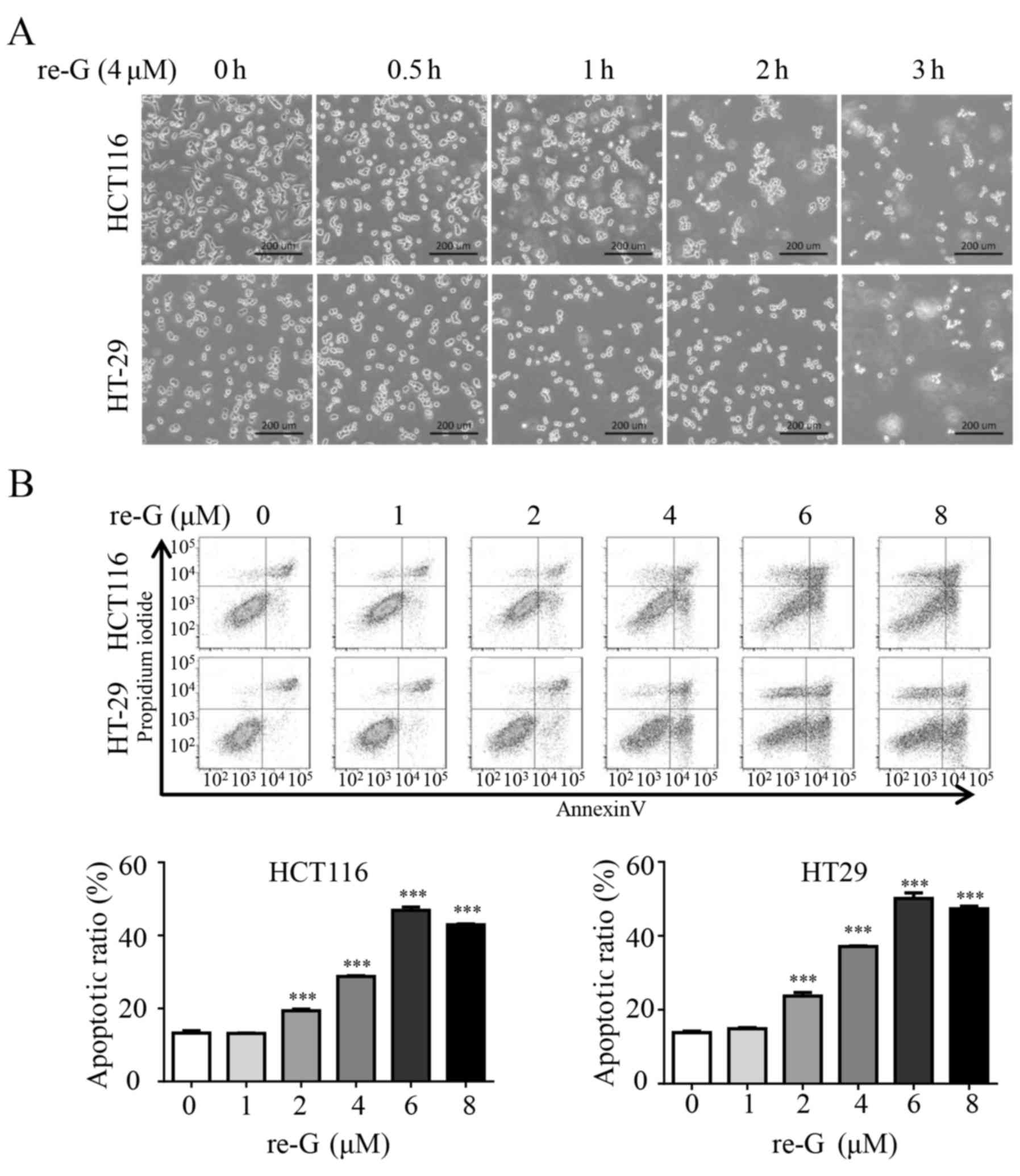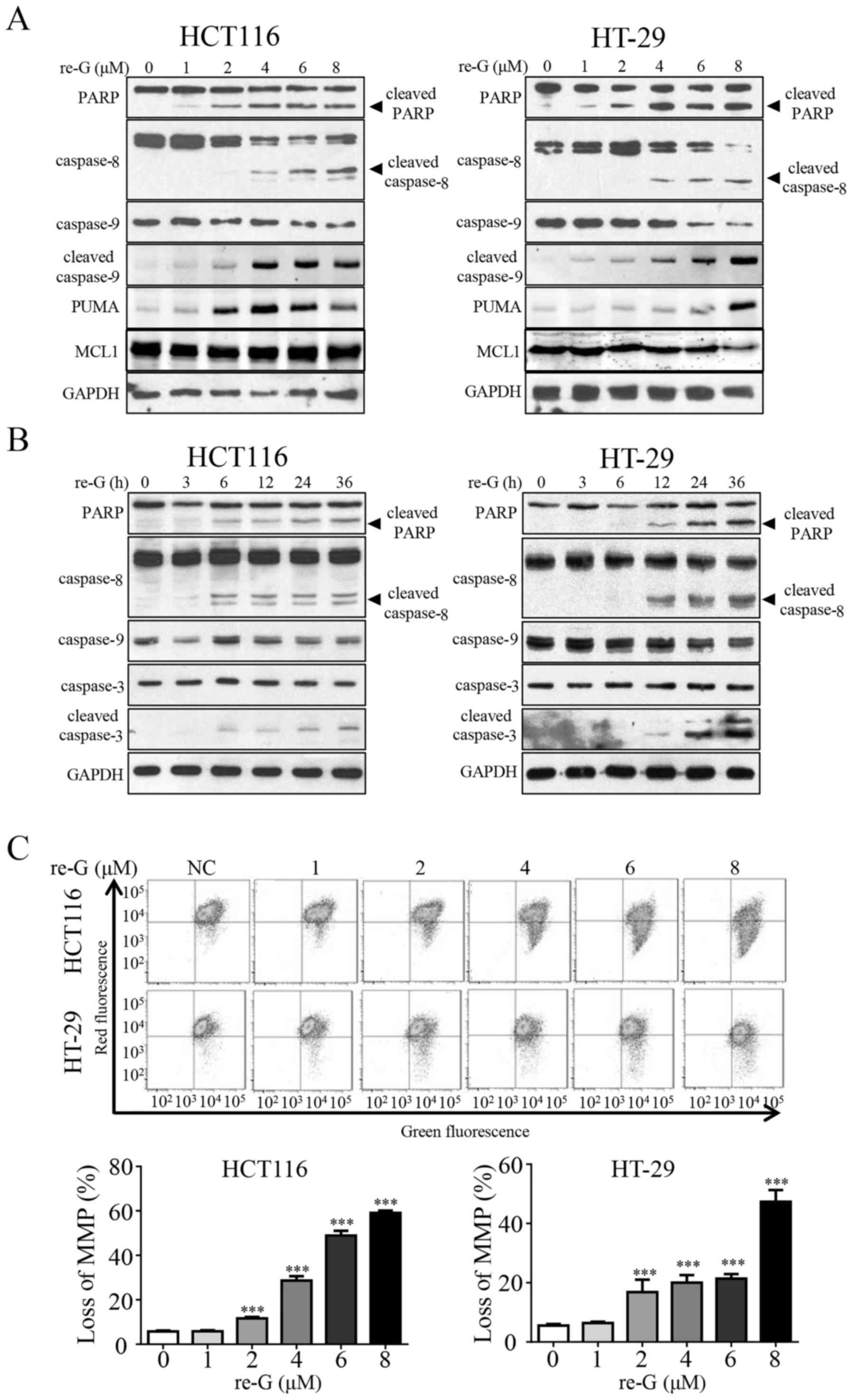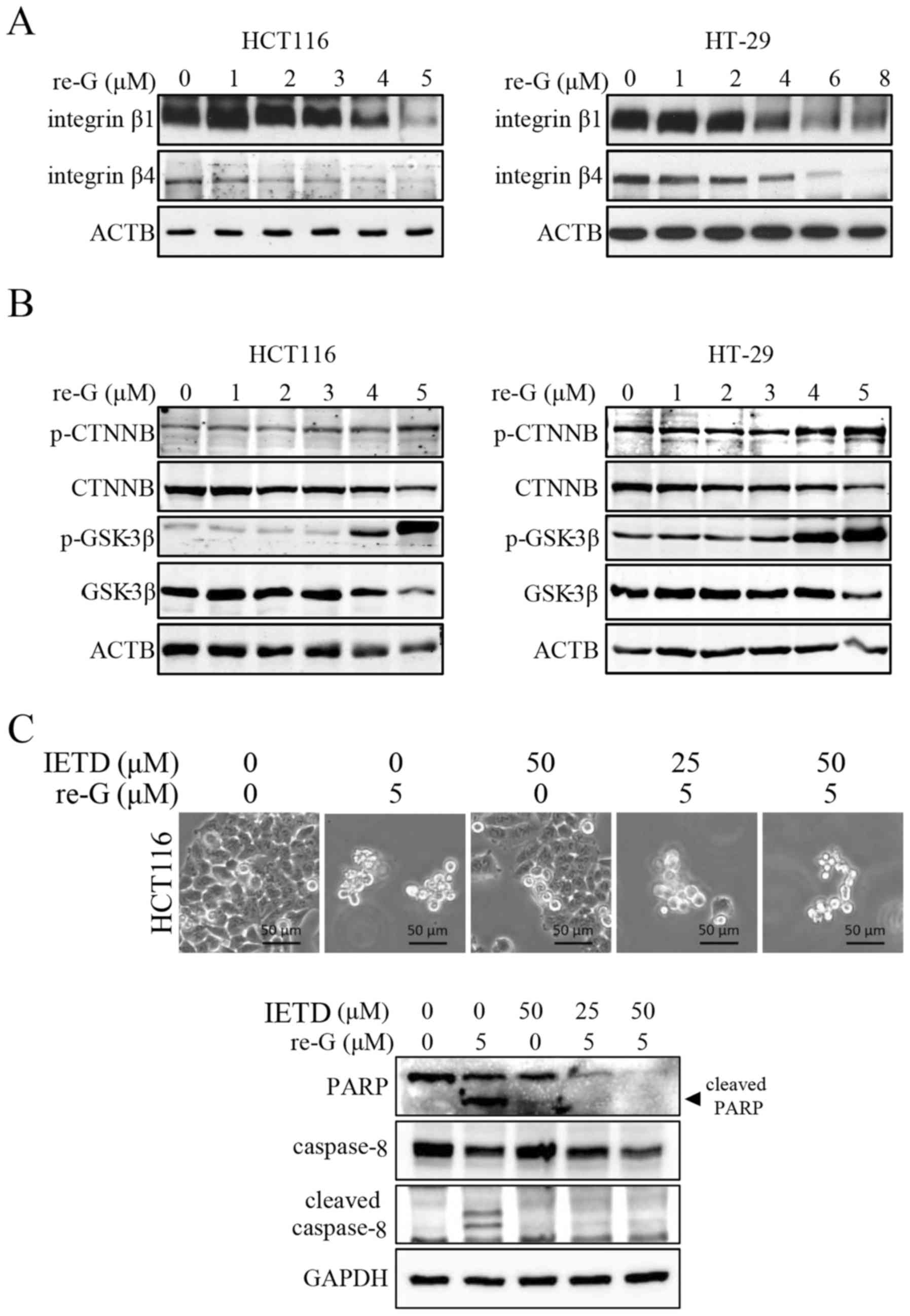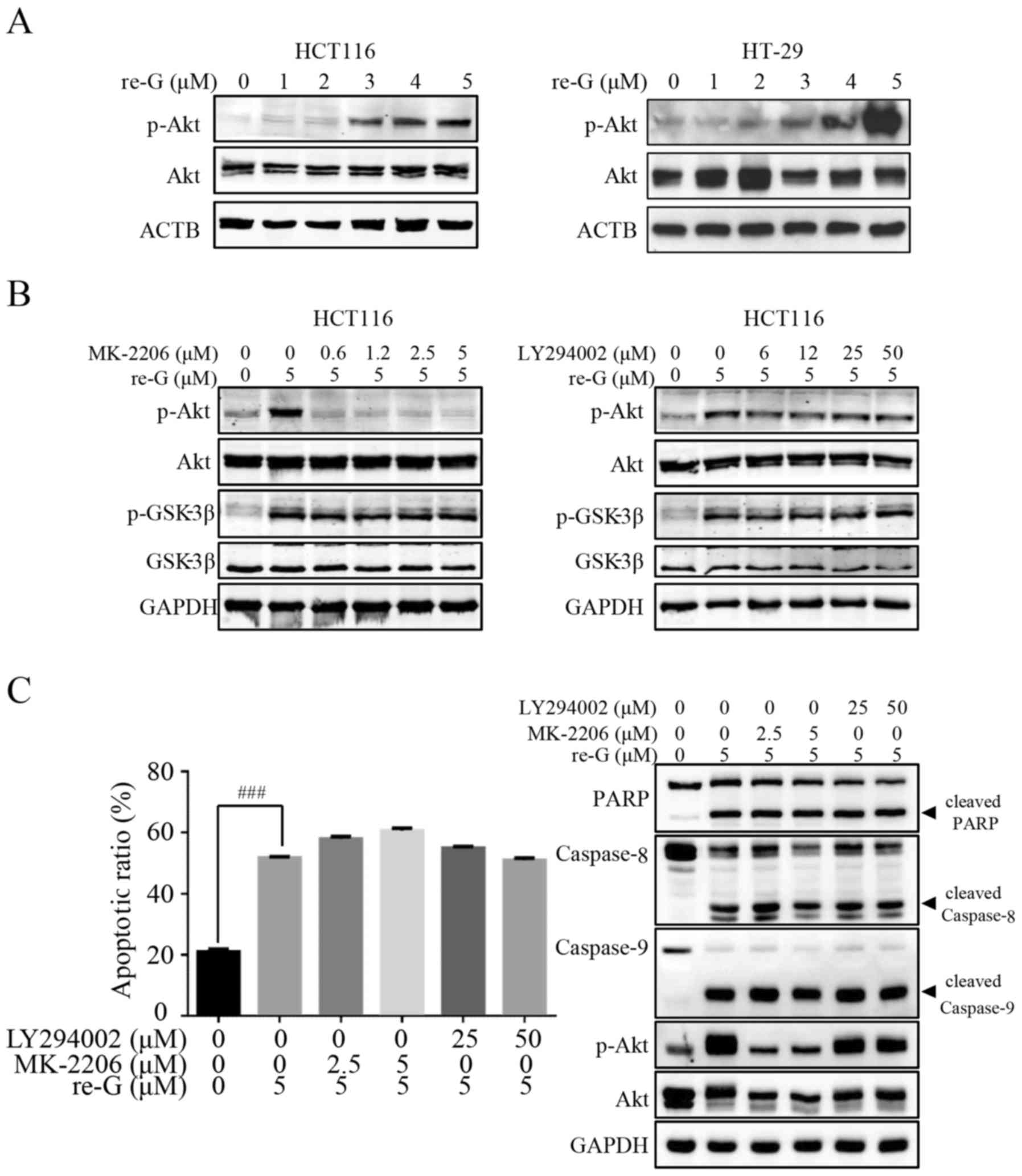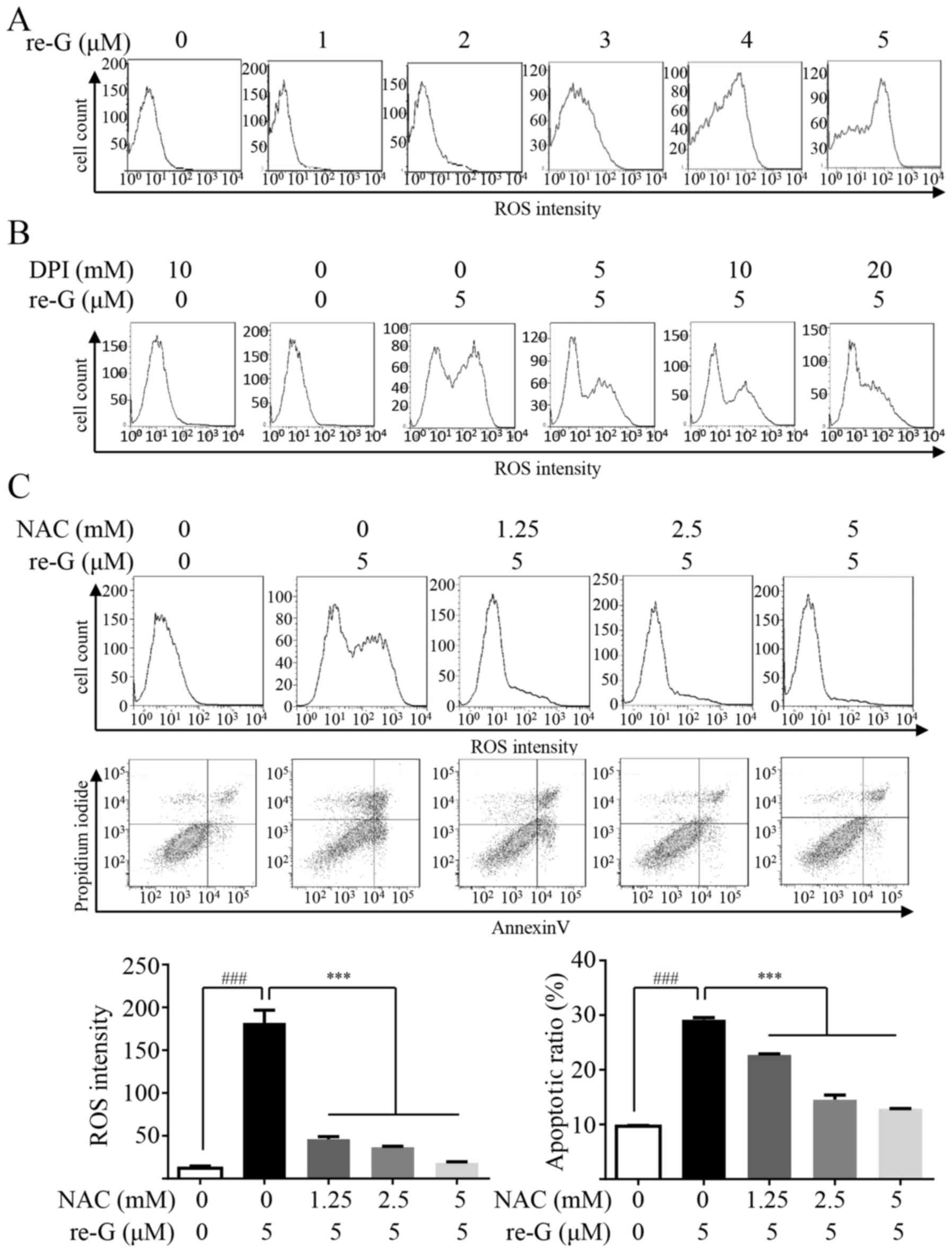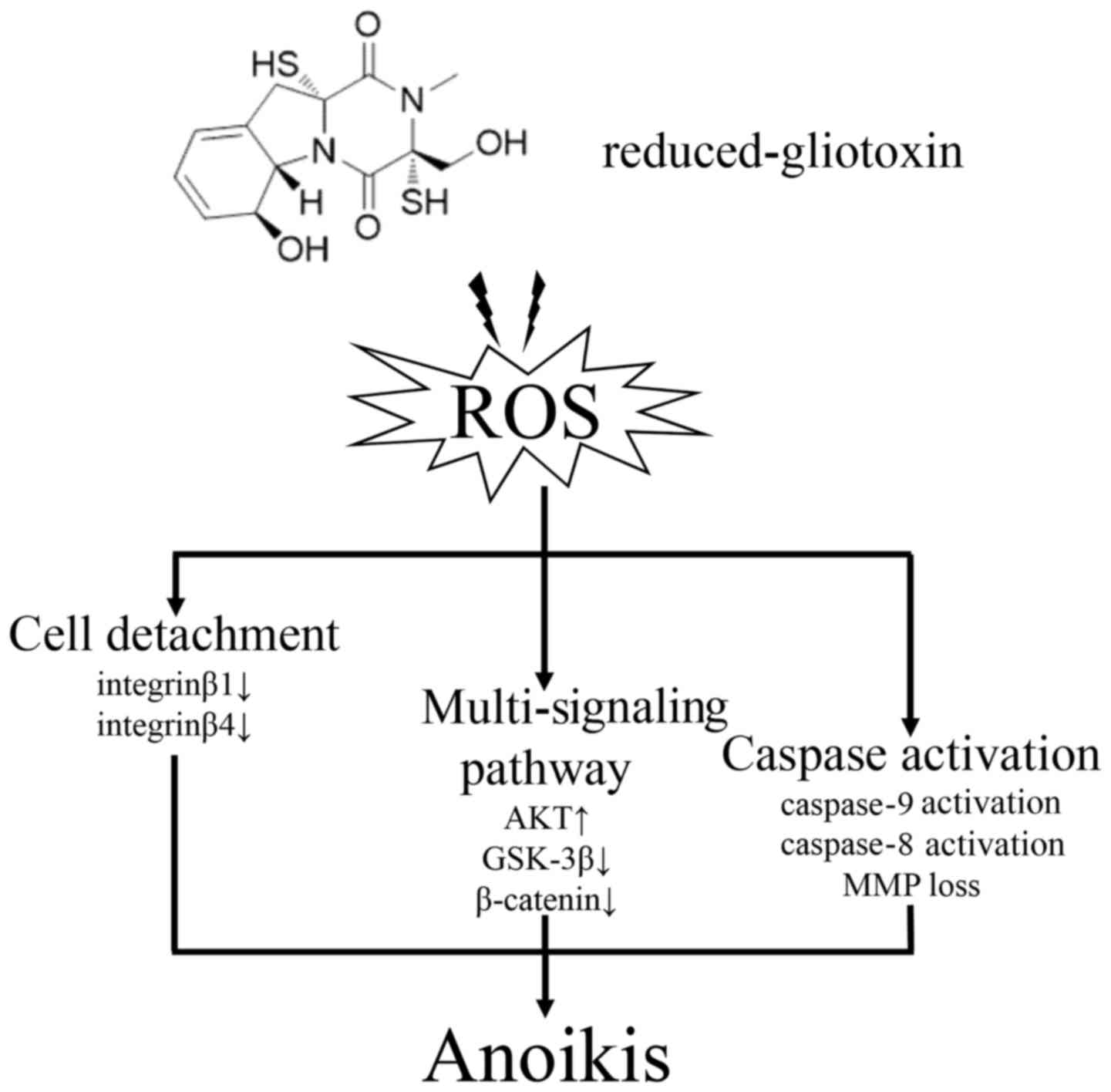|
1
|
Siegel RL, Miller KD and Jemal A: Cancer
statistics, 2016. CA Cancer J Clin. 66:7–30. 2016. View Article : Google Scholar : PubMed/NCBI
|
|
2
|
Chen W, Zheng R, Baade PD, Zhang S, Zeng
H, Bray F, Jemal A, Yu XQ and He J: Cancer statistics in China,
2015. CA Cancer J Clin. 66:115–132. 2016. View Article : Google Scholar : PubMed/NCBI
|
|
3
|
Siegel RL, Miller KD, Fedewa SA, Ahnen DJ,
Meester RGS, Barzi A and Jemal A: Colorectal cancer statistics,
2017. CA Cancer J Clin. 67:177–193. 2017. View Article : Google Scholar : PubMed/NCBI
|
|
4
|
März L and Piso P: Treatment of peritoneal
metastases from colorectal cancer. Gastroenterol Rep (Oxf).
3:298–302. 2015.
|
|
5
|
Gilmore AP: Anoikis. Cell Death Differ.
12(Suppl 2): 1473–1477. 2005. View Article : Google Scholar : PubMed/NCBI
|
|
6
|
Chiarugi P and Giannoni E: Anoikis: A
necessary death program for anchorage-dependent cells. Biochem
Pharmacol. 76:1352–1364. 2008. View Article : Google Scholar : PubMed/NCBI
|
|
7
|
Grossmann J: Molecular mechanisms of
'detachment-induced apoptosis - Anoikis'. Apoptosis. 7:247–260.
2002. View Article : Google Scholar : PubMed/NCBI
|
|
8
|
Simpson CD, Anyiwe K and Schimmer AD:
Anoikis resistance and tumor metastasis. Cancer Lett. 272:177–185.
2008. View Article : Google Scholar : PubMed/NCBI
|
|
9
|
Nagaprashantha LD, Vatsyayan R, Lelsani
PC, Awasthi S and Singhal SS: The sensors and regulators of
cell-matrix surveillance in anoikis resistance of tumors. Int J
Cancer. 128:743–752. 2011. View Article : Google Scholar
|
|
10
|
Shanmugathasan M and Jothy S: Apoptosis,
anoikis and their relevance to the pathobiology of colon cancer.
Pathol Int. 50:273–279. 2000. View Article : Google Scholar : PubMed/NCBI
|
|
11
|
Frisch SM and Screaton RA: Anoikis
mechanisms. Curr Opin Cell Biol. 13:555–562. 2001. View Article : Google Scholar : PubMed/NCBI
|
|
12
|
Cragg GM and Newman DJ: Natural products:
A continuing source of novel drug leads. Biochim Biophys Acta.
1830:3670–3695. 2013. View Article : Google Scholar : PubMed/NCBI
|
|
13
|
Saleem M, Ali MS, Hussain S, Jabbar A,
Ashraf M and Lee YS: Marine natural products of fungal origin. Nat
Prod Rep. 24:1142–1152. 2007. View
Article : Google Scholar : PubMed/NCBI
|
|
14
|
Liang WL, Le X, Li HJ, Yang XL, Chen JX,
Xu J, Liu HL, Wang LY, Wang KT, Hu KC, et al: Exploring the
chemodiversity and biological activities of the secondary
metabolites from the marine fungus Neosartorya pseudofischeri. Mar
Drugs. 12:5657–5676. 2014. View Article : Google Scholar : PubMed/NCBI
|
|
15
|
Bugni TS and Ireland CM: Marine-derived
fungi: A chemically and biologically diverse group of
microorganisms. Nat Prod Rep. 21:143–163. 2004. View Article : Google Scholar : PubMed/NCBI
|
|
16
|
Lan WJ, Fu SJ, Xu MY, Liang WL, Lam CK,
Zhong GH, Xu J, Yang DP and Li HJ: Five new cytotoxic metabolites
from the marine fungus Neosartorya pseudofischeri. Mar Drugs.
14:182016. View Article : Google Scholar : PubMed/NCBI
|
|
17
|
Yan DF, Lan WJ, Wang KT, Huang L, Jiang CW
and Li HJ: Two chlorinated benzofuran derivatives from the marine
fungus Pseudallescheria boydii. Nat Prod Commun. 10:621–622.
2015.PubMed/NCBI
|
|
18
|
Yamada A, Kataoka T and Nagai K: The
fungal metabolite gliotoxin: Immunosuppressive activity on
CTL-mediated cytotoxicity. Immunol Lett. 71:27–32. 2000. View Article : Google Scholar : PubMed/NCBI
|
|
19
|
Sun Y, Takada K, Takemoto Y, Yoshida M,
Nogi Y, Okada S and Matsunaga S: Gliotoxin analogues from a
marine-derived fungus, Penicillium sp., and their cytotoxic and
histone methyltransferase inhibitory activities. J Nat Prod.
75:111–114. 2012. View Article : Google Scholar
|
|
20
|
Chen J, Wang C, Lan W, Huang C, Lin M,
Wang Z, Liang W, Iwamoto A, Yang X and Liu H: Gliotoxin inhibits
proliferation and induces apoptosis in colorectal cancer cells. Mar
Drugs. 13:6259–6273. 2015. View Article : Google Scholar : PubMed/NCBI
|
|
21
|
Nguyen VT, Lee JS, Qian ZJ, Li YX, Kim KN,
Heo SJ, Jeon YJ, Park WS, Choi IW, Je JY, et al: Gliotoxin isolated
from marine fungus Aspergillus sp induces apoptosis of human
cervical cancer and chondrosarcoma cells. Mar Drugs. 12:69–87.
2013. View Article : Google Scholar : PubMed/NCBI
|
|
22
|
Hubmann R, Hilgarth M, Schnabl S, Ponath
E, Reiter M, Demirtas D, Sieghart W, Valent P, Zielinski C, Jäger
U, et al: Gliotoxin is a potent NOTCH2 transactivation inhibitor
and efficiently induces apoptosis in chronic lymphocytic leukaemia
(CLL) cells. Br J Haematol. 160:618–629. 2013. View Article : Google Scholar : PubMed/NCBI
|
|
23
|
Pan XQ and Harday J: Electromicroscopic
observations on gliotoxin-induced apoptosis of cancer cells in
culture and human cancer xenografts in transplanted SCID mice. In
Vivo. 21:259–265. 2007.PubMed/NCBI
|
|
24
|
Burnette WN: 'Western blotting':
Electrophoretic transfer of proteins from sodium dodecyl sulfate -
polyacrylamide gels to unmodified nitrocellulose and radiographic
detection with antibody and radioiodinated protein A. Anal Biochem.
112:195–203. 1981. View Article : Google Scholar : PubMed/NCBI
|
|
25
|
Geissler A, Haun F, Frank DO, Wieland K,
Simon MM, Idzko M, Davis RJ, Maurer U and Borner C: Apoptosis
induced by the fungal pathogen gliotoxin requires a triple
phosphorylation of Bim by JNK. Cell Death Differ. 20:1317–1329.
2013. View Article : Google Scholar : PubMed/NCBI
|
|
26
|
Maamer-Azzabi A, Ndozangue-Touriguine O
and Bréard J: Metastatic SW620 colon cancer cells are primed for
death when detached and can be sensitized to anoikis by the
BH3-mimetic ABT-737. Cell Death Dis. 4:e8012013. View Article : Google Scholar : PubMed/NCBI
|
|
27
|
Fulda S and Debatin KM: Extrinsic versus
intrinsic apoptosis pathways in anticancer chemotherapy. Oncogene.
25:4798–4811. 2006. View Article : Google Scholar : PubMed/NCBI
|
|
28
|
Ata R and Antonescu CN: Integrins and cell
metabolism: An intimate relationship impacting cancer. Int J Mol
Sci. 18:182017. View Article : Google Scholar
|
|
29
|
Alanko J, Mai A, Jacquemet G, Schauer K,
Kaukonen R, Saari M, Goud B and Ivaska J: Integrin endosomal
signalling suppresses anoikis. Nat Cell Biol. 17:1412–1421. 2015.
View Article : Google Scholar : PubMed/NCBI
|
|
30
|
Yoo BH, Masson O, Li Y, Khan IA, Gowda PS
and Rosen KV: Anoikis of colon carcinoma cells triggered by
β-catenin loss can be enhanced by tumor necrosis factor receptor 1
antagonists. Oncogene. 34:4939–4951. 2015. View Article : Google Scholar
|
|
31
|
Paoli P, Giannoni E and Chiarugi P:
Anoikis molecular pathways and its role in cancer progression.
Biochim Biophys Acta. 1833:3481–3498. 2013. View Article : Google Scholar : PubMed/NCBI
|
|
32
|
Liu C, Li Y, Semenov M, Han C, Baeg GH,
Tan Y, Zhang Z, Lin X and He X: Control of beta-catenin
phosphorylation/degradation by a dual-kinase mechanism. Cell.
108:837–847. 2002. View Article : Google Scholar : PubMed/NCBI
|
|
33
|
Luo J: Glycogen synthase kinase 3beta
(GSK3beta) in tumorigenesis and cancer chemotherapy. Cancer Lett.
273:194–200. 2009. View Article : Google Scholar
|
|
34
|
Pardo J, Urban C, Galvez EM, Ekert PG,
Müller U, Kwon-Chung J, Lobigs M, Müllbacher A, Wallich R, Borner
C, et al: The mitochondrial protein Bak is pivotal for
gliotoxin-induced apoptosis and a critical host factor of
Aspergillus fumigatus virulence in mice. J Cell Biol. 174:509–519.
2006. View Article : Google Scholar : PubMed/NCBI
|
|
35
|
Kweon YO, Paik YH, Schnabl B, Qian T,
Lemasters JJ and Brenner DA: Gliotoxin-mediated apoptosis of
activated human hepatic stellate cells. J Hepatol. 39:38–46. 2003.
View Article : Google Scholar : PubMed/NCBI
|
|
36
|
Suen YK, Fung KP, Lee CY and Kong SK:
Gliotoxin induces apoptosis in cultured macrophages via production
of reactive oxygen species and cytochrome c release without
mitochondrial depolarization. Free Radic Res. 35:1–10. 2001.
View Article : Google Scholar : PubMed/NCBI
|
|
37
|
Ruoslahti E and Reed JC: Anchorage
dependence, integrins, and apoptosis. Cell. 77:477–478. 1994.
View Article : Google Scholar : PubMed/NCBI
|
|
38
|
Beaulieu JF: Integrin α6β4 in colorectal
cancer. World J Gastrointest Pathophysiol. 1:3–11. 2010. View Article : Google Scholar
|
|
39
|
Scartozzi M, Giampieri R, Loretelli C,
Mandolesi A, del Prete M, Biagetti S, Alfonsi S, Faloppi L,
Bianconi M, Bittoni A, et al: Role of β4 integrin in
HER-3-negative, K-RAS wild-type metastatic colorectal tumors
receiving cetuximab. Future Oncol. 9:1207–1214. 2013. View Article : Google Scholar : PubMed/NCBI
|
|
40
|
Fujita S, Watanabe M, Kubota T, Teramoto T
and Kitajima M: Alteration of expression in integrin beta 1-subunit
correlates with invasion and metastasis in colorectal cancer.
Cancer Lett. 91:145–149. 1995. View Article : Google Scholar : PubMed/NCBI
|
|
41
|
Pelillo C, Mollica H, Eble JA, Grosche J,
Herzog L, Codan B, Sava G and Bergamo A: Inhibition of adhesion,
migration and of α5β1 integrin in the HCT-116 colorectal cancer
cells treated with the ruthenium drug NAMI-A. J Inorg Biochem.
160:225–235. 2016. View Article : Google Scholar : PubMed/NCBI
|
|
42
|
Scharf DH, Brakhage AA and Mukherjee PK:
Gliotoxin - bane or boon? Environ Microbiol. 18:1096–1109. 2016.
View Article : Google Scholar
|















